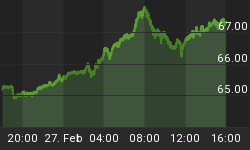According to a recent article in Crain's New York Business, "consumers are rushing to park their money in New York banks" as 12-month CDs hit 5% interest rates for the first time in six years.
That suggests we have reached a point, as far as individuals are concerned, where cash has become a viable alternative to other, more risky investments.
At the same time, Japanese central bankers are poised to tighten monetary policy following half a decade of "quantitative easing," while the European Central Bank boosted interest rates this week to 2.5 percent and indicated further hikes are possible.
That suggests we have reached a point where fund managers must take into account a much different global monetary policy environment than they have been used to, which will likely spur a more defensive approach to sector and market weightings.
In addition, several high profile companies, including Intel -- which cut its first quarter revenue and gross margin forecasts Friday -- have recently warned that the outlook for their businesses is less promising than many had hoped for or expected.
That suggests we have reached a point where the persistent optimism about forward earnings that has played a key role in supporting a robust exposure to equities -- and which has helped to drive share prices towards post-2000 recovery highs -- will be reassessed.
We have also seen clear evidence that the once bubbly housing market, which has been a major spur to consumer spending this decade, is cooling off. Just this week, for example, there were reports that new-home sales hit their lowest level in a year and the number of properties on the market was the most ever.
Under the circumstances, it seems that homeowners -- the prime beneficiaries of the real estate-as-ATM phenomenon -- will be downsizing their spending and borrowing, especially in light of their increased energy costs and the prospect of higher mortgage rates.
That suggests we have reached a point where a significant source of economic firepower, the American consumer, will be significantly diminished. And with the personal savings rate near historic lows, odds are, in fact, that many will look to boost cash on hand. Typically, those funds end up in a bank or under a mattress, not in the equity market.
Thus, despite the apparently widespread sense that there is little reason to adjust overall equity exposure, more recent developments suggest the catalysts for an imminent -- and potentially high impact -- shift in asset allocation preferences are already in place.















